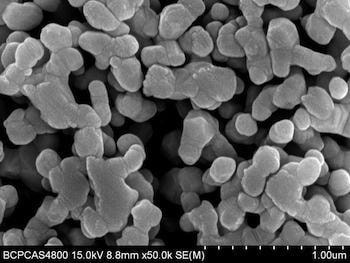Silver nanoparticles prevent HIV infection
Research by Mexican scientists at the University of Monterrey shows that silver nanoparticles can block the transmission of HIV and other sexually transmitted pathogens, opening up new directions for drug development.
 |
Silver nanoparticles under microscope
The MNT news site quoted the research team's explanation that a protein called GP120 helps HIV bind to immune system cells to infect. Through experiments on vaginal cream containing silver nanoparticles on cervical mucus tissue samples, they found that silver nanoparticles attached themselves to GP120 and blocked the activity of this protein, making it impossible for HIV to spread. They said the cream started working one minute after application and lasted for 72 hours after use. The research team will test the drug on mice that have been genetically modified to have human-like immune cells before considering clinical trials on humans in the future. With a similar mechanism of action, this drug also has the ability to prevent the spread of human papillomavirus (HPV) and some other sexually transmitted pathogens.
According to Hanoi Moi






